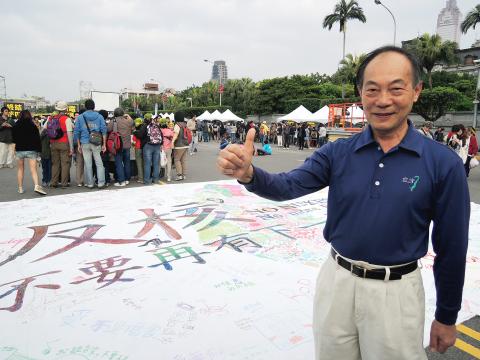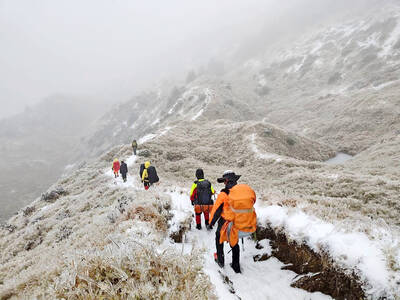Bookstore owner Wu Cheng-hsan (吳成三), 72, was overjoyed on Thursday last week — Double Ten National Day — to see an anti-nuclear flag raised by activists in a demonstration held in front of the Legislative Yuan in Taipei.
Last year, Wu said he started to notice an increase in discussion about the anti-nuclear flag, adding that he has also seen various coffee shops displaying anti-nuclear flags.
“The passion I felt for anti-nuclear events two decades ago came rushing back into me,” Wu said, adding that he contacted the Green Citizens’ Action Alliance, who designed the flags, and volunteered his shop to become a distribution point for anti-nuclear flags.

Photo: Tang Chia-ling, Taipei Times
Wu said he initially placed an order for 100 flags and was worried that he would not be able to sell them.
He did not expect that he would have to place five additional orders in two months and sell a total of 600 flags.
“Some have even taken the flags abroad and displayed them in Hong Kong, the US and Canada,” Wu said.
Wu said there have been “significant changes” in Taiwan’s anti-nuclear movement, adding that two decades ago, the majority of protesters were from academic circles because “the police tended to treat them better [in comparison to other protesters] and wouldn’t haul them off to jail.”
Wu said the nation’s anti-nuclear movement now is attracting more young people, and as a result there are different ways of presenting their objectives, adding that he found the anti-nuclear flag very creative.
“It doesn’t require a specialist or academic to rattle off long strings of obscure terminology. It is accessible to the general public,” Wu said, adding that distributing the flag was a practical method of spreading the movement’s message because it is easily recognizable.
Wu, a long-time supporter of the anti-nuclear movement, said his involvement in the campaign started when he was studying abroad.
“I saw how Westerners took to the streets to protest the construction of nuclear reactors because they did not want their children to be affected by nuclear waste,” Wu said, adding that he learned that people must oppose what is wrong.
After his return to Taiwan 20 years ago, Wu jumped into the anti-nuclear scene because “as an individual who loved hiking, I could not accept any destruction to natural beauty.”
At the time, the government was considering starting construction on the Fourth Nuclear Power Plant in Gongliao District (貢寮), New Taipei City (新北市), Wu said.
“I did not want any government development to destroy the natural beauty of Formosa,” he added.
The three nuclear plants currently in operation — Jinshan Nuclear Power Plant in New Taipei City’s Shimen District (石門), Guosheng Nuclear Power Plant in New Taipei City’s Wanli District (萬里) and the Ma-anshan Nuclear Power Plant in Pingtung County’s Ma-anshan (馬鞍山) — provide about 20 percent of the country’s electricity and are scheduled to be decommissioned starting in 2018.
The construction of the fourth plant has stretched over 14 years and has so far cost about NT$300 billion (US$10 billion) and has faced mounting criticism and concerns about nuclear power.
According to the alliance, 14,000 flags have been printed, sold and hung across the nation since the idea was launched on Oct. 10 last year.
The alliance said it hopes to get footage of either one entire house, apartment building or an entire street covered with anti-nuclear flags, asking for any volunteers to send their footage to http://nonukeyesvote.tw/newsCT.php?news_no=4.

Trips for more than 100,000 international and domestic air travelers could be disrupted as China launches a military exercise around Taiwan today, Taiwan’s Civil Aviation Administration (CAA) said yesterday. The exercise could affect nearly 900 flights scheduled to enter the Taipei Flight Information Region (FIR) during the exercise window, it added. A notice issued by the Chinese Civil Aviation Administration showed there would be seven temporary zones around the Taiwan Strait which would be used for live-fire exercises, lasting from 8am to 6pm today. All aircraft are prohibited from entering during exercise, it says. Taipei FIR has 14 international air routes and

The Ministry of National Defense (MND) today released images of the military tracking China’s People's Liberation Army (PLA) movements during the latest round of Chinese drills around Taiwan. The PLA began "Justice Mission 2025" drills today, carrying out live-fire drills, simulated strikes on land and maritime targets, and exercises to blockade the nation's main ports. The exercises are to continue tomorrow, with the PLA announcing sea and air space restrictions for five zones around Taiwan for 10 hours starting from 8:30am. The ministry today released images showing a Chinese J-16 fighter jet tracked by a F-16V Block 20 jet and the

Snow fell on Yushan (Jade Mountain, 玉山) yesterday morning as a continental cold air mass sent temperatures below freezing on Taiwan’s tallest peak, the Central Weather Administration (CWA) said. Snowflakes were seen on Yushan’s north peak from 6:28am to 6:38am, but they did not fully cover the ground and no accumulation was recorded, the CWA said. As of 7:42am, the lowest temperature recorded across Taiwan was minus-5.5°C at Yushan’s Fengkou observatory and minus-4.7°C at the Yushan observatory, CWA data showed. On Hehuanshan (合歡山) in Nantou County, a low of 1.3°C was recorded at 6:39pm, when ice pellets fell at Songsyue Lodge (松雪樓), a

NO SHAME IN RETREAT: Hikers should consider turning back if the weather turns bad or if they do not have sufficient equipment, the Taroko park headquarters said Two people died of hypothermia over the weekend while hiking on Hsuehshan (雪山), prompting park authorities to remind hikers to bring proper equipment and consider their physical condition before setting out in the cold weather. Temperatures dropped over the weekend, bringing snow to high altitudes in Shei-pa National Park. One hiker, surnamed Lin (林), who on Friday was traveling with a group of six along the Hsuehshan west ridge trail, lost consciousness due to hypothermia and died, the Shei-pa National Park Headquarters said. On Saturday, another hiker, surnamed Tien (田), in a group of five on the southeast of the west